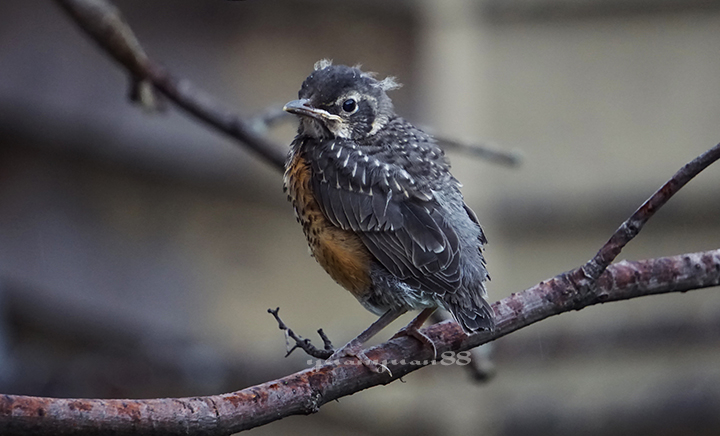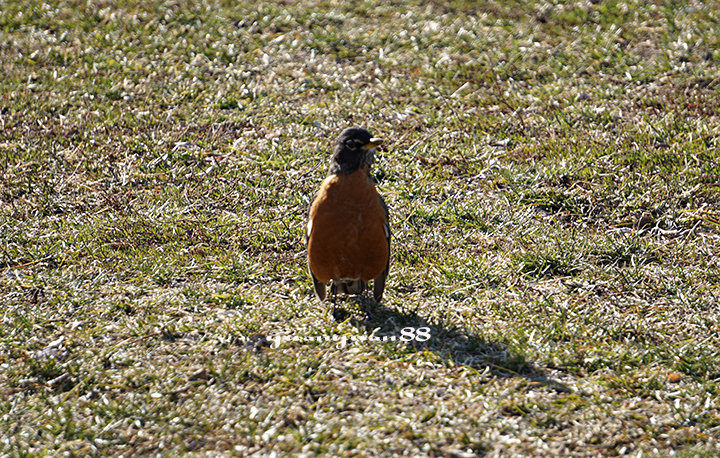個人資料
最新文章
文章分類
歸檔
2008 (68)
2009 (39)
2011 (37)
2012 (104)
2013 (107)
2014 (76)
2015 (66)
2016 (71)
2017 (65)
2018 (87)
2024 (1)

正文
出門不久,眼前一晃突然看見了一隻鳥飛在了樹枝上,然後看見另一隻飛來,前麵的那隻就張大了嘴巴,原來是隻小小的知更鳥,剛離窩還不太會飛,趕緊回家拿相機,心想再回去可能早飛走了,但還是存著僥幸心。果然,小小知更鳥飛的能力還不強,還在那老老的抓住樹枝等著媽媽來喂食。我悄悄地靠近,它也看見我了,但它不能飛走,飛走的話媽媽回來找不到它了。所以它就看著我好像對我說,它要等媽媽回來,讓我不要傷害它,我也就停在了能夠拍到的位置,然後就像個稻草人一動不動的站在那兒,輕輕地打開相機拍,因為我要讓它的媽媽知道我隻是個稻草人,不會妨礙它們的,果然它媽媽看看我覺得沒有很大的危脅,就繼續喂著小鳥。媽媽每次喂完後就飛走再去找,其中等的時間有的挺長的,畢竟要找到蚯蚓也是要花些時間的,小小知更鳥就犯困,看看我,看著看著就會打磕睡,這樣我大概拍了一個小時,後來下雨了,開始還好,後來越下越大,我拿了個信封擋在相機的上方,人隻能在雨中淋個澡了,我舍不得走開,這樣的拍攝機會太難得了,簡直是碰上了。但後來雨太大了,信封濕透了,相機不能淋濕,我隻好告別了小小鳥,看它還在雨中等著媽媽送來吃的,它要快快的長大。
我拍到了媽媽抓來了好大的蚯蚓,小小鳥吃起來可真爽啊。看得我都流口水。點擊視頻看可愛的小小知更鳥。
小小知更鳥(看得出羽毛不發達,所以飛起來還很菜。)

成年知更鳥(胸前一大片橘紅色,典型的知更鳥模樣。)

下麵是我參照網上找來的內容重新編寫的解說詞。
That day I saw an American robin flew to sit on a branch. I realized this was a baby robin when I saw its parent was feeding it. I took out my camera and was quietly filming about an hour. The baby saw me but it had to stay there to wait for its parent. This gave me the golden opportunity to film the amazing scene. And I googled robin and learned a lot of this bird. This baby must be two weeks old and is a fledgling just left the nest.
Baby robins are ready to leave the nest when they are about 13 days old. Leaving the nest is called fledging. This is a dangerous time for baby robins. Once babies fledge, both parents still feed them for a few days. Baby robins can't fly well when they leave the nest. They must build up muscles and grow adult feathers to be strong fliers. The babies are capable fliers just 10-15 days after fledging. Mom soon leaves to lay a new clutch of eggs. The fledglings will need to learn from other robins when Dad leaves to help with new nestlings. So I could not tell whether it was the mother or father feeding this baby.
After Mon laid the eggs, the first baby hatches 12-14 days. Hatching can take all day. Each chick must fight its way out of the egg. First it breaks a hole in the shell with its egg tooth, a hook on its beak. Then the baby pokes, stretches, and struggles inside the egg, with many stops to rest. Finally it breaks free.
A newly-hatched robins weigh about 5.5 grams, a little less than a quarter. Baby robin skin is clear enough to allow us to see some of the internal organs. Three things a baby robin know as soon as it hatches;to sit very still when its parents are away, to pop up and open its mouth to beg for food the moment its parents return, and to poop as soon as it swallows some food. Baby robins produce their poop in fecal sacs, encased in strong membranes. They don't leak, so the nest is clean. Baby robins are helpless at birth but grow fast! They reach the size of their parents after just two weeks!
When they first hatch, they probably don't recognize their parents! They know the parents have arrived with food by the "bounce" they feel on the nest, and on a sunny day by their parents' shadow. Little by little, they start learning the sounds of their parents. By the time their eyes open, they already know their parents' voices.
Robins identify their babies by sight and sound, not by smell.
For the first four days of a nestling's life, the parent birds regurgitate partly digested food into each baby's mouth . By five days of age, the nestlings get earthworms that parents break into small mouthfuls. Soon parents give them whole worms and large insects, and worms are not even their main food! Both parents have full-time jobs. They protect the nest, find food, and feed hungry babies. A robin might make 100 feeding visits to its nest each day. So you can see robins are very responsible and busy birds.
It started raining. It rained hard on me and the bird. I had to say goodbye to the baby.
歡迎來我的頻道定閱
我拍到了媽媽抓來了好大的蚯蚓,小小鳥吃起來可真爽啊。看得我都流口水。點擊視頻看可愛的小小知更鳥。
小小知更鳥(看得出羽毛不發達,所以飛起來還很菜。)

成年知更鳥(胸前一大片橘紅色,典型的知更鳥模樣。)

下麵是我參照網上找來的內容重新編寫的解說詞。
That day I saw an American robin flew to sit on a branch. I realized this was a baby robin when I saw its parent was feeding it. I took out my camera and was quietly filming about an hour. The baby saw me but it had to stay there to wait for its parent. This gave me the golden opportunity to film the amazing scene. And I googled robin and learned a lot of this bird. This baby must be two weeks old and is a fledgling just left the nest.
Baby robins are ready to leave the nest when they are about 13 days old. Leaving the nest is called fledging. This is a dangerous time for baby robins. Once babies fledge, both parents still feed them for a few days. Baby robins can't fly well when they leave the nest. They must build up muscles and grow adult feathers to be strong fliers. The babies are capable fliers just 10-15 days after fledging. Mom soon leaves to lay a new clutch of eggs. The fledglings will need to learn from other robins when Dad leaves to help with new nestlings. So I could not tell whether it was the mother or father feeding this baby.
After Mon laid the eggs, the first baby hatches 12-14 days. Hatching can take all day. Each chick must fight its way out of the egg. First it breaks a hole in the shell with its egg tooth, a hook on its beak. Then the baby pokes, stretches, and struggles inside the egg, with many stops to rest. Finally it breaks free.
A newly-hatched robins weigh about 5.5 grams, a little less than a quarter. Baby robin skin is clear enough to allow us to see some of the internal organs. Three things a baby robin know as soon as it hatches;to sit very still when its parents are away, to pop up and open its mouth to beg for food the moment its parents return, and to poop as soon as it swallows some food. Baby robins produce their poop in fecal sacs, encased in strong membranes. They don't leak, so the nest is clean. Baby robins are helpless at birth but grow fast! They reach the size of their parents after just two weeks!
When they first hatch, they probably don't recognize their parents! They know the parents have arrived with food by the "bounce" they feel on the nest, and on a sunny day by their parents' shadow. Little by little, they start learning the sounds of their parents. By the time their eyes open, they already know their parents' voices.
Robins identify their babies by sight and sound, not by smell.
For the first four days of a nestling's life, the parent birds regurgitate partly digested food into each baby's mouth . By five days of age, the nestlings get earthworms that parents break into small mouthfuls. Soon parents give them whole worms and large insects, and worms are not even their main food! Both parents have full-time jobs. They protect the nest, find food, and feed hungry babies. A robin might make 100 feeding visits to its nest each day. So you can see robins are very responsible and busy birds.
It started raining. It rained hard on me and the bird. I had to say goodbye to the baby.
歡迎來我的頻道定閱




謝謝你的留言,離巢後要10-15天才能飛得像大人一樣,這段時間小鳥還是很危險的,還要爸爸媽媽喂。
Thanks a lot.
這個拍攝太難得了,要知道我的鏡頭不長,平時想拍個鳥,你走進一步它早飛走了,那能給你拍。這隻雛鳥不太會飛,也不能飛,抓住樹枝等媽媽回來喂它,所以它一直看我,看我沒有進一步的動作,就打磕睡,我也不敢再往前,怕真的飛走了,它媽媽找不到它,那就害了它,它自己還不能自食其力,可後來雨下大了,我隻能走了。